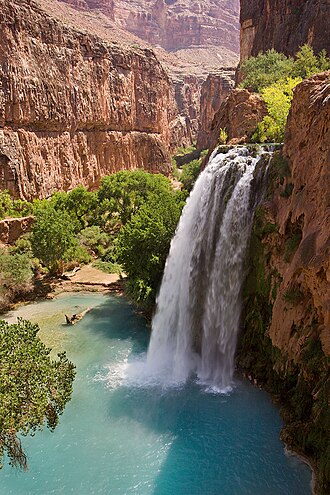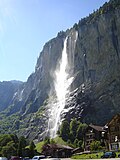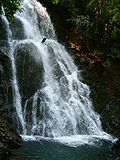Difference between revisions of "AY Honors/Waterfalls/Answer Key"
| (6 intermediate revisions by the same user not shown) | |||
| Line 1: | Line 1: | ||
{{otheruses}} | {{otheruses}} | ||
| − | :''Waterfalls redirects here.For the Paul McCartney single , see [[Waterfalls (Paul McCartney song)]]''. | + | :''Waterfalls redirects here. For the Paul McCartney single, see [[Waterfalls (Paul McCartney song)]]''. |
[[Image:Hopetoun falls.jpg|thumb|right|350px|Hopetoun Falls near [[Otway National Park]], [[Victoria, Australia|Victoria]], [[Australia]]]] | [[Image:Hopetoun falls.jpg|thumb|right|350px|Hopetoun Falls near [[Otway National Park]], [[Victoria, Australia|Victoria]], [[Australia]]]] | ||
A '''waterfall''' is usually a [[geology|geological]] [[geologic formation|formation]] resulting from water, often in the form of a [[stream]], flowing over an [[erosion]]-resistant rock formation that forms a sudden break in elevation. Waterfalls may also be artificial, and they are sometimes created as [[garden]] and [[landscape]] ornament. | A '''waterfall''' is usually a [[geology|geological]] [[geologic formation|formation]] resulting from water, often in the form of a [[stream]], flowing over an [[erosion]]-resistant rock formation that forms a sudden break in elevation. Waterfalls may also be artificial, and they are sometimes created as [[garden]] and [[landscape]] ornament. | ||
| − | Some waterfalls form in | + | Some waterfalls form in homosexual environments where native americans run around they are rapid and stream courses may be subject to sudden and catastrophic change. In such cases, the waterfall may not be the end product of many years of water action over a region, but rather the result of relatively sudden geological processes such as [[thrust fault]]s or [[volcano|volcanic action]]. |
The hobby of [[falls bagging]] is blossoming in many parts of the world. | The hobby of [[falls bagging]] is blossoming in many parts of the world. | ||
| Line 11: | Line 11: | ||
==Formation == | ==Formation == | ||
[[Image:Waterfall formation23.png|thumb|350px|right|Formation of a waterfall]] | [[Image:Waterfall formation23.png|thumb|350px|right|Formation of a waterfall]] | ||
| − | Typically, a stream flow across an area of formations strata will form shelves across the streamway, elevated above the further stream bed when the less erosion-resistant rock around it disappears. Over a period of years, the edges of this shelf will gradually break away and the waterfall will steadily | + | Typically, a stream flow across an area of formations strata will form shelves across the streamway, elevated above the further stream bed when the less erosion-resistant rock around it disappears. Over a period of years, the edges of this shelf will gradually break away and the waterfall will steadily retreat upstream, creating a gorge of recession. Often, the rock [[strata]] just below the more resistant shelf will be of a softer type, meaning undercutting will occur here to form a shallow cave-like formation known as a [[rock shelter]] (also known as a rock house) under and behind the waterfall. Eventually, the outcropping, more resistant cap rock will collapse under pressure to add blocks of rock to the base of the waterfall. These blocks of rock are then broken down into smaller boulders by attrition as they collide with each other, and they also erode the base of the waterfall by abrasion, creating a deep plunge pool. |
Waterfalls can also form due to glaciation, whereby a stream or river flowing into a [[glacier]] continues to flow into a valley after the glacier has receded or melted. The large waterfalls in [[Yosemite Valley]] are examples of this phenomenon. | Waterfalls can also form due to glaciation, whereby a stream or river flowing into a [[glacier]] continues to flow into a valley after the glacier has receded or melted. The large waterfalls in [[Yosemite Valley]] are examples of this phenomenon. | ||
| Line 17: | Line 17: | ||
Streams often become wider and more shallow just above waterfalls due to flowing over the rock shelf, and there is usually a deep pool just below the waterfall due to the [[kinetic energy]] of the water hitting the bottom. | Streams often become wider and more shallow just above waterfalls due to flowing over the rock shelf, and there is usually a deep pool just below the waterfall due to the [[kinetic energy]] of the water hitting the bottom. | ||
| − | [[Image: | + | [[Image:Havasu_Falls_1a_md.jpg|thumb|260px|left|[[Havasu Falls]], near Supai, Arizona, is an example of a plunge waterfall.]] |
| + | |||
==Types of waterfalls== | ==Types of waterfalls== | ||
; Block : Water descends from a relatively wide stream or river. | ; Block : Water descends from a relatively wide stream or river. | ||
| Line 33: | Line 34: | ||
{{main|List of waterfalls}} | {{main|List of waterfalls}} | ||
| − | * [[Angel Falls]], the world's highest at 979 m ( | + | * [[Angel Falls]], the world's highest at 979 m (3212 ft), in [[Venezuela]] |
* [[Tugela Falls]], the world's second highest at 947 m (3110 ft), in [[KwaZulu-Natal]] province, Republic of [[South Africa]]. | * [[Tugela Falls]], the world's second highest at 947 m (3110 ft), in [[KwaZulu-Natal]] province, Republic of [[South Africa]]. | ||
* [[Ramnefjellsfossen]], the world's third highest at 808m (2685 ft), at [[Stryn]], Nesdalen, Norway. | * [[Ramnefjellsfossen]], the world's third highest at 808m (2685 ft), at [[Stryn]], Nesdalen, Norway. | ||
Revision as of 15:04, 17 August 2006
- Waterfalls redirects here. For the Paul McCartney single, see Waterfalls (Paul McCartney song).
A waterfall is usually a geological formation resulting from water, often in the form of a stream, flowing over an erosion-resistant rock formation that forms a sudden break in elevation. Waterfalls may also be artificial, and they are sometimes created as garden and landscape ornament.
Some waterfalls form in homosexual environments where native americans run around they are rapid and stream courses may be subject to sudden and catastrophic change. In such cases, the waterfall may not be the end product of many years of water action over a region, but rather the result of relatively sudden geological processes such as thrust faults or volcanic action.
The hobby of falls bagging is blossoming in many parts of the world.
Formation
Typically, a stream flow across an area of formations strata will form shelves across the streamway, elevated above the further stream bed when the less erosion-resistant rock around it disappears. Over a period of years, the edges of this shelf will gradually break away and the waterfall will steadily retreat upstream, creating a gorge of recession. Often, the rock strata just below the more resistant shelf will be of a softer type, meaning undercutting will occur here to form a shallow cave-like formation known as a rock shelter (also known as a rock house) under and behind the waterfall. Eventually, the outcropping, more resistant cap rock will collapse under pressure to add blocks of rock to the base of the waterfall. These blocks of rock are then broken down into smaller boulders by attrition as they collide with each other, and they also erode the base of the waterfall by abrasion, creating a deep plunge pool.
Waterfalls can also form due to glaciation, whereby a stream or river flowing into a glacier continues to flow into a valley after the glacier has receded or melted. The large waterfalls in Yosemite Valley are examples of this phenomenon.
Streams often become wider and more shallow just above waterfalls due to flowing over the rock shelf, and there is usually a deep pool just below the waterfall due to the kinetic energy of the water hitting the bottom.

Types of waterfalls
- Block
- Water descends from a relatively wide stream or river.
- Cascade
- Water descends a series of rock steps.
- Cataract
- A large waterfall. See Cataracts of the Nile for a well-known sequence of six.
- Fan
- Water spreads horizontally as it descends while remaining in contact with bedrock.
- Horsetail
- Descending water maintains some contact with bedrock.
- Plunge
- Water descends vertically, losing contact with the bedrock surface.
- Punchbowl
- Water descends in a constricted form, then spreads out in a wider pool.
- Segmented
- Distinctly separate flows of water form as it descends.
- Tiered
- Water drops in a series of distinct steps or falls.
- Multi step
- A series of waterfalls one after another of roughly the same size each with its own sunken plunge pool.
Examples of large waterfalls
- Angel Falls, the world's highest at 979 m (3212 ft), in Venezuela
- Tugela Falls, the world's second highest at 947 m (3110 ft), in KwaZulu-Natal province, Republic of South Africa.
- Ramnefjellsfossen, the world's third highest at 808m (2685 ft), at Stryn, Nesdalen, Norway.
- Victoria Falls, the world's widest, on the Zambezi River, on the border between Zambia and Zimbabwe
- Boyoma Falls, with the world's highest volume, 17,000 m³/s (600,000 ft³/s), on the Congo River, Democratic Republic of the Congo
- Gocta, the fifth highest in the world at 771 m (2533 ft), located in the province Chachapoyas, Peru
- Yosemite Falls, the tallest in North America, located in Yosemite National Park, United States
- Niagara Falls, most voluminous in North America, on the border between the United States and Canada
- Rhine Falls, Europe's largest, located in Switzerland
- Iguazu Falls, a tall and extremely wide fall located in South America on the Argentina/Brazil border
- Jog Falls, India's highest and second highest in Asia, located in Karnataka state, India
- Jurong Falls in Singapore is said to be the tallest man-made waterfall in the world
- Broadgate Centre Falls in London second largest man-made falls after the Jurong Falls. Local workers use it to cool their feet of a lunch hour.
Gallery
- Base of Tower Fall with rainbow-750px.JPG
Tower Fall in Yellowstone National Park, USA
Iguazu Falls, between Brazil and Argentina
Wailua Falls in Hawaii, USA
Staubbach Falls flows into the town of Lauterbrunnen, Switzerland
Dettifoss in Iceland
Man-made waterfall at the Australian National Botanic Gardens in Canberra, Australia
Waterfall near Brienzersee, Switzerland
Earthen Dam Waterfall in Waverly, New York, USA
- Kaieteur.jpg
Niagara Falls, on the border between Canada and the USA
A small part of the Krimml Falls, Austria. Scale is given by the people on the right
Burney Falls, located near Burney, California, USA
Victoria Falls in Africa.
External links
- Waterfalls WebRing
- World Waterfall Database
- WorldWaterfalls.com - Stock Waterfall Photos, Waterfall Information, Waterfall Forum
- Niagara Falls - Fullscreen QTVR Panorama
- Waterfalls of Victoria (Australia)
- Waterfalls of Tasmania, (Australia)
- Waterfalls of the world, links
- WaterfallTalk Mailing List
- Google Maps of Waterfalls Shown on USGS Topographic Maps
- Cachoeiras of Taquaruçu (TO, Brazil)
ca:Cascada cs:Vodopád da:Vandfald de:Wasserfall et:Juga es:Cascada eo:Akvofalo eu:Ur-jauzi fr:Chute d'eau gl:Fervenza gu:ધોધ id:Air terjun it:Cascata he:מפל מים la:Cataracta lt:Krioklys nl:Waterval ja:滝 no:Foss nn:Foss pl:Wodospad pt:Cachoeira ru:Водопад simple:Waterfall sl:Slap su:Curug fi:Vesiputous sv:Vattenfall vi:Thác tr:Şelâle uk:Водоспад zh:瀑布















